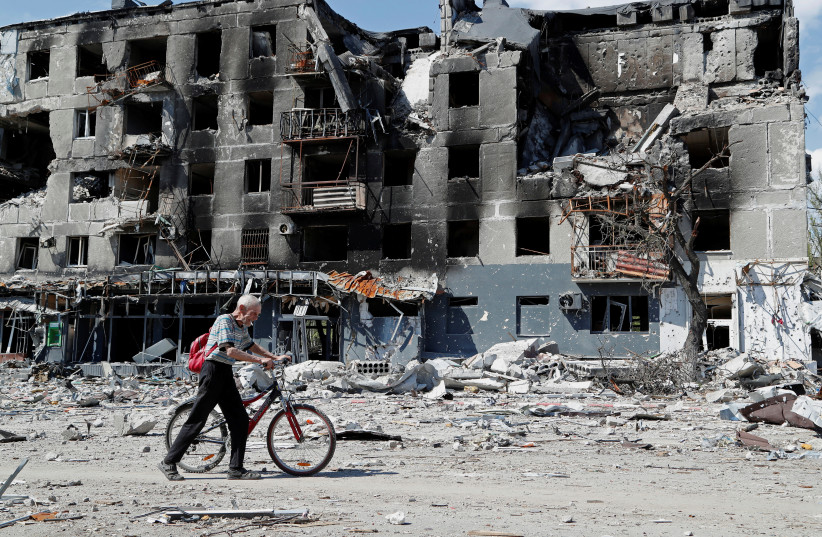The Sea of Azov has become an inland sea in Russia, Crimean parliament speaker Vladimir Konstantinov said in an interview with TASS Friday.
The Sea of Azov itself is a small sea located on the shores of Russia and Ukraine and is connected to the Black Sea by the Strait of Krech. The sea is an important shipping waterway and is a profitable fishing area.
Throughout the ongoing Russian invasion of Ukraine, Russia has exerted control over the area due to their existing borders and control of Crimea, which it seized in 2014, but Ukraine has still had a strong presence on its shores.
These were specifically seen in the regions of Ukraine that border the Sea of Azov, which are the Kherson, Zaporizhzhia and Donetsk oblasts. While Donetsk has been heavily controlled by the pro-Russian separatist-run breakaway the Donetsk People's Republic (DPR), they didn't have control over the entire oblast, specifically the vital port city of Mariupol.
However, the situation has changed in the ongoing Russian invasion. In that time, several major cities in the Zaporizhzhia Oblast have been occupied by Russia, specifically the cities of Berdyansk, Melitopol and Berdyansk.

The same is also true for the majority of the Kherson Oblast, and after fierce fighting, the city of Mariupol has all but fallen, with the last remnants of the Ukrainian defenders holding out in the Azovstal steel plant in the city.
As such, Russia has nearly complete control over the entire Sea of Azov.
For Crimea, this is incredibly important. Since 2014, Ukraine has cut off Russian-controlled Crimea from energy, water and other supplies. But with the Sea of Azov now under Russian control, this crisis could now be alleviated.
However, this will also allow for greater consolidation of power in the occupied Kherson and Zaporizhzhia oblasts.
"Kherson is now completely administratively liberated, there is no Ukraine there," Konstantinov told TASS, citing the importance of self-organization.
He further cited the need for a "constant presence of Russian troops in the region in the form of a military base, followed by the transition to civil administration, then elections and self-organization" and added that "the main result will be after the completion of the special operation, the result of which will be the destruction of the Nazi state of Ukraine."
"Special military operation" is the term Russia uses to refer to the invasion of Ukraine, as it does not recognize the ongoing conflict as a war.
Konstantinov further said that "the very word 'Ukraine' is alien," adding that it must be eradicated.
He further cited accusations made by Russia that Ukrainian forces are shelling their own people in Kherson, to which he clarified to TASS "You understand, in Ukraine the concept of 'state' or statehood' as a national value does not exist in the minds of people, because there are no traditions of statehood, no history of statehood. The dominant mentality there is farming."
The regions occupied by Russia in eastern Ukraine, Konstantinov claimed to TASS, are all self-sufficient, contrasting it with how, in his words, "western Ukraine is all subsidized, unprofitable" and "parasitic."
<br>Consolidating power
Reports over the past month from the Ukrainian Intelligence Directorate (GUR) have accused Russia of working to consolidate power in the occupied areas in Kherson and Zaporizhzhia, as well as in the Mykolaiv Oblast.
The GUR reported the presence of posters, booklets, flyers and ballots for a referendum for the residents of Kherson to vote on the oblast becoming an independent state.
These referendums have precedence, as Russia did very much the same in 2014 for Crimea when it came to joining Russia. This referendum was widely panned and recognized as illegitimate by the international community, especially Ukraine.
However, it is unclear how successful Russia will be, as Ukrainian resistance remains fierce in many areas.
In particular, regarding Mariupol, Russian forces that are attempting to establish a pro-Russian administrative control of the city. According to a report by the think tank the Institute for the Study of War (ISW), the authorities in Mariupol cooperating with Rusisan forces are being guided by Russia's Federal Security Services (FSB) rather than the forces of the DPR.
Despite this, DPR forces were working as police to maintain order. But many of these forces have reportedly been forced to move to respond to riots elsewhere in the Donetsk Oblast.
Further, according to the ISW, factional infighting in Mariupol is ongoing, made worse by the evacuation of Ukrainian defenders from Azovstal.
As such, the efforts for Russia to fully take control over the area is still ongoing.
